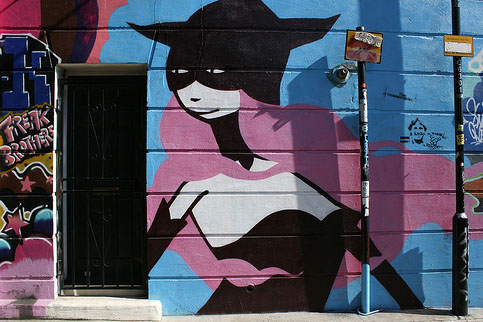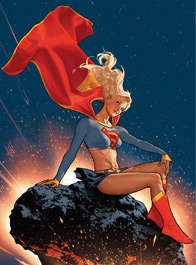
Flickr/<a href="http://www.flickr.com/photos/olenkaolja/">L-plate big cheese</a> (<a href="http://www.creativecommons.org" target="_blank">Creative Commons</a>).
Because I don’t often read comics, it had completely slipped my mind that DC Comics’ Batwoman came out as a lesbian in 2006. I was reminded while reading a recent blog by Eric Grignol at change.org, which details the superheroine’s gay-rightsy travails with a policy just like “Don’t Ask, Don’t Tell.” Grignol describes the storyline:
Readers find that as a young adult, Batwoman is at the top of her class at the United States Military Academy. When it’s discovered that she’s in a lesbian relationship with another student, she’s asked to deny the allegations or be expelled for violation of the military’s code of conduct. She could stay in the military if she’d just tell her commanding officer “what he needed to hear.”
Batwoman’s response? She bravely cites the cadet honor code: “A cadet will not lie, cheat, or steal, nor suffer other to do so. I’m sorry sir, I can’t.”
Refusing to lie about who she is, Batwoman is discharged and forced to leave her potential life of service behind. What follows is depression fueled by drugs and alcohol after sacrificing one part of her identity (military career) for another part (lesbian individual), until finding a redemptive relationship with another woman. Through the whole ordeal, Batwoman never questions her decision to be honest and truthful about her sexual orientation.
Batwoman in a drug-fueled depression prompted by dismissal from the military for her lesbianism? Sign me up. Apparently I’ve been wasting my time watching oil wrestling on The L Word; the most interesting and up-to-date pop cultural explorations of sexuality and society seem to be taking place on the pages of a comic book. I guess this makes Batwoman the Lieutenant Dan Choi of comic characters. Or does it make Lieutenant Dan Choi the Batwoman of real-life “Don’t Ask, Don’t Tell” abolitionists?
Now if only Batwoman could speak at congressional hearings on the policy slated for next year-ish.






